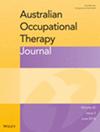The rewards and challenges of self-managing National Disability Insurance Scheme: Exploration of parental perspectives
Abstract
Introduction
Under the National Disability Insurance Scheme (NDIS), participants can self-manage their funding. This management style largely deviates from previous Australian service systems. The self-management option provides NDIS participants flexibility and choice in accessing any services; however, it generates an administrative burden. In 2019, parents of children with disability had the highest percentage of using the self-management option. Parents of children commonly have high child-care responsibilities and experience health issues. Given the administrative burden associated with the self-management option, the experiences of these parents should be documented.
Aim
This study aimed to explore the experiences of parents of children with disability as they fully or partly self-manage their children's NDIS funding.
Methods
Semi-structured individual interviews were conducted with 16 parents. The transcribed data were analysed, using reflexive thematic analysis.
Consumer and Community Involvement
No service user was involved in this study.
Findings
Four themes were generated: (1) Feeling empowered by having control and choice for my child's needs; (2) it is time-consuming, and overwhelming, but glad to have chosen this option; (3) need to be responsible because you run a business with public funding; and (4) professional background and disability networks help self-management.
Conclusion
The research provides insight into how parents navigate the complexity of NDIS as they self-manage to benefit their children. While self-management is overwhelming, it provides choice and control to parents, fostering parenting self-efficacy. The research highlights the importance of a support network, diverse skills, and knowledge to efficiently self-manage NDIS funding, which should be considered as occupational therapists support parents of children with disability.

 求助内容:
求助内容: 应助结果提醒方式:
应助结果提醒方式:


